|
|
|
Sort Order |
|
|
|
Items / Page
|
|
|
|
|
|
|
| Srl | Item |
| 1 |
ID:
130619
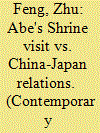

|
|
|
| 2 |
ID:
157389
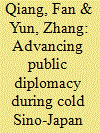

|
|
|
|
|
| Summary/Abstract |
Tense political relations are seen as a barrier to China's public diplomacy with Japan. despite various setbacks, Confucius Institute, a classic example of public diplomacy, have continued to stay open in Japan. This paper uses the Confucius Institute at Ritsumeikan (CIR) as a case study to explore how public diplomacy can be carried out when political relations between China and Japan are cold. It concludes that cold political relations do not necessarily mean public diplomacy will fail. Good cooperation with Japanese partners can bring positive results.Also, choosing the right partner is important; government interference should be avoided. Finally, China should deal with each Confucius Institute differently, and Japanese universities enthusiasm should be stimulated through encouragement and retreat mechanisms.
|
|
|
|
|
|
|
|
|
|
|
|
|
|
|
|
| 3 |
ID:
132552
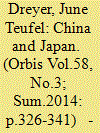

|
|
|
|
|
| Publication |
2014.
|
| Summary/Abstract |
According to integration theory, growing economic interdependence between China and Japan should have spilled over into more cordial political relations. The opposite occurred, as summarized in the phrase "hot economics, cold politics." Even as both sides acknowledge the value of cooperation for shared benefit, commercial and strategic rivalries have intensified, calling into question the validity of integration theory.
|
|
|
|
|
|
|
|
|
|
|
|
|
|
|
|
| 4 |
ID:
130193


|
|
|
|
|
| Publication |
2014.
|
| Summary/Abstract |
In 2013, China's new party and state leadership specified its domestic and foreign policies in the context of Xi Jinping's vision of the ''Chinese Dream.'' A new reform package modifying China's growth and development model has been announced. In foreign policy, a debate has commenced regarding another side of the ''Chinese Dream'': China's rise as a ''Great Power.''
|
|
|
|
|
|
|
|
|
|
|
|
|
|
|
|
| 5 |
ID:
112216
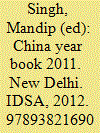

|
|
|
|
|
| Publication |
New Delhi, IDSA, 2012.
|
| Description |
144p.
|
| Standard Number |
9789382169048
|
|
|
|
|
|
|
|
|
|
|
|
Copies: C:2/I:0,R:0,Q:0
Circulation
| Accession# | Call# | Current Location | Status | Policy | Location |
| 056517 | 951.05/SIN 056517 | Main | On Shelf | General | |
| 056518 | 951.05/SIN 056518 | Main | On Shelf | General | |
|
|
|
|
| 6 |
ID:
130626
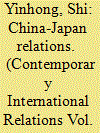

|
|
|
| 7 |
ID:
112626
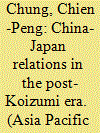

|
|
|
|
|
| Publication |
2012.
|
| Summary/Abstract |
The tenure of Japanese Prime Minister Junichiro Koizumi (2001-2006) was vexing for China-Japan relations. As such, the five years since Koizumi left office, particularly the change in Japan's ruling party, were initially expected, and sometimes perceived, to realize a half-decade of recovery and reconciliation in Sino-Japanese ties. While tensions did decrease, "icebergs" blocking improvement in relations have not completely thawed, and may harden again. Competition for political and economic influences and interests in the same region, concern over one another's future security posture and relations with Taiwan, territorial disputes, misunderstanding about the other's historical sensitivities and feelings of distrust, occasionally manipulated by nationalists, still pervade the relationship. Therefore, though there is mutual desire, indeed a necessity, for cooperation on many issues affecting both countries, this typically couples with a disconcerting or anxious feeling towards the other's intentions that results in competitiveness. There are deep roots to this need/fear complex.
|
|
|
|
|
|
|
|
|
|
|
|
|
|
|
|
| 8 |
ID:
156328
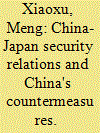

|
|
|
|
|
| Summary/Abstract |
Since the nationalization of the Diaoyu Islands by Japan in 2012, mutual trust between China and Japan has been declining, and bilateral security relations have reached a low point. In the near future, China-Japan security relations will face more challenges than opportunities. China should make measures to impose necessary pressure on Japan and to strengthen interpersonal communication and understanding between people of the two countries.
|
|
|
|
|
|
|
|
|
|
|
|
|
|
|
|
| 9 |
ID:
145629
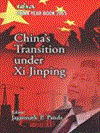

|
|
|
|
|
| Publication |
New Delhi, Pentagon Press, 2016.
|
| Description |
xviii, 427p.hbk
|
| Standard Number |
9788182749078
|
|
|
|
|
|
|
|
|
|
|
|
Copies: C:2/I:0,R:0,Q:0
Circulation
| Accession# | Call# | Current Location | Status | Policy | Location |
| 058700 | 327.51/PAN 058700 | Main | On Shelf | General | |
| 058701 | 327.51/PAN 058701 | Main | On Shelf | General | |
|
|
|
|
| 10 |
ID:
178218
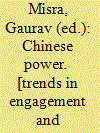

|
|
|
|
|
| Publication |
New Delhi, KW Publishers Pvt Ltd, 2021.
|
| Description |
xii, 243p.hbk
|
| Standard Number |
9789389137972
|
|
|
|
|
|
|
|
|
|
|
|
Copies: C:2/I:0,R:0,Q:0
Circulation
| Accession# | Call# | Current Location | Status | Policy | Location |
| 059999 | 327.51/MIS 059999 | Main | On Shelf | General | |
| 060000 | 327.51/MIS 060000 | Main | On Shelf | General | |
|
|
|
|
| 11 |
ID:
171148
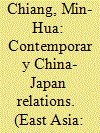

|
|
|
|
|
| Summary/Abstract |
This article presents the importance of political factors in the development of China-Japan economic relations over the last four decades. The China-US reconciliation and the rise of the pro-China Japanese Prime Minister Tanaka Kakuei (1972–1974) led to the normalization of China-Japan relations in 1972. The bilateral political rapport was further consolidated in the face of the common threat in the Soviet Union. With the strengthening political relations, the bilateral economic exchanges were gradually developed. Nonetheless, following the collapse of the Soviet Union, mounting Sino-US tension, China’s growing assertiveness, and rising nationalism in both China and Japan, the Sino-Japanese bilateral political relations have been deteriorating. The escalating political tensions have impacted bilateral economic relations, including declining Japanese investment in China, weakening bilateral trade, and decreasing Japanese visitors to China. Despite improving bilateral political relations in recent years, it is uncertain how long these friendly gestures by the leaders of the two countries may last given several unsettled territorial and historical issues. The growing tension between the United States and China further adds uncertainty to China-Japan relations in the future. Without strong political relations, weakening economic ties cannot be easily restored.
|
|
|
|
|
|
|
|
|
|
|
|
|
|
|
|
| 12 |
ID:
133130
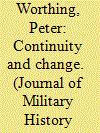

|
|
|
|
|
| Publication |
2014.
|
| Summary/Abstract |
This article analyzes the Chinese Nationalist Army at the tactical level, examining how the Nationalists deployed and employed forces to achieve victory from the earliest battles in 1925 to the first stage of the war against the Japanese in 1937-1938. It argues that certain "core characteristics" of the Nationalist Army shaped its tactics in a way that maximized its strengths and minimized its weaknesses, producing a number of important victories from 1925 to 1930. Importantly, the year 1930 marked a key turning point as new enemies and conditions led the Nationalists away from the successful tactics of the 1920s, contributing to the weaker record of the 1930s.'
|
|
|
|
|
|
|
|
|
|
|
|
|
|
|
|
| 13 |
ID:
131257
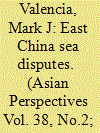

|
|
|
|
|
| Publication |
2014.
|
| Summary/Abstract |
The dispute over ownership of islands, maritime boundaries, jurisdiction, perhaps as much as 100 billion barrels of oil equivalent, and other nonliving and living marine resources in the East China Sea continues to bedevil China-Japan relations. Historical and cultural factors, such as the legacy of World War II and burgeoning nationalism, are significant factors in the dispute. Indeed, the dispute seems to have become a contest between national identities. The approach to the issue has been a political dance by the two countries: one step forward, two steps back. In this article I explain the East China Sea dispute, explore its effect on China-Japan relations, and suggest ways forward.
|
|
|
|
|
|
|
|
|
|
|
|
|
|
|
|
| 14 |
ID:
131258
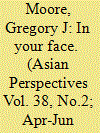

|
|
|
|
|
| Publication |
2014.
|
| Summary/Abstract |
While China's rising power is certainly an important variable in Sino-Japanese relations, it cannot explain either why the Diaoyu/Senkaku Islands dispute broke out anew in the fall of 2012 or why the Chinese response was so strong. China read Japan's move to nationalize the islands as an in-your-face move designed to show disrespect for China and make Japan's sovereignty over the islands a fait accompli. In this article I borrow from Robert Putnam's notion of twolevel games to argue that there are two levels of face politics going on in this case: one between domestic actors in Japan and in China, the other between the two countries. A solution to the territorial dispute can only be found when both sides' "face needs" are recognized and met at both levels of analysis.
|
|
|
|
|
|
|
|
|
|
|
|
|
|
|
|
| 15 |
ID:
085721
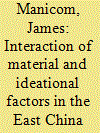

|
|
|
|
|
| Publication |
2008.
|
| Summary/Abstract |
This article seeks to explain the current phase of the East China Sea dispute between China and Japan. It argues that previous analyses privilege one aspect of the dispute over the other. Some stress the nationalist dimension of the dispute while others argue the primary motivations relate to the material wealth of the seabed combined with increased energy needs in China and Japan. By analysing the interaction between the nationalist (ideational) and resource (material) dimensions, it becomes clear why it has become increasingly difficult for policy elites in either state to seek compromise. This is because nationalist constituencies in China and Japan have extended their nationalist/ideational sentiment from the Senkaku/Diaoyu Islands to the entire East China Sea. Simultaneously, Beijing and Tokyo's interest in the material exploitation and security of the East China Sea has risen.
|
|
|
|
|
|
|
|
|
|
|
|
|
|
|
|
| 16 |
ID:
131259
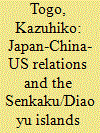

|
|
|
|
|
| Publication |
2014.
|
| Summary/Abstract |
In this analysis of the Senkaku/Diaoyu, including the US role, I employ the framework of Western theories of international relations (IR). The analysis turns to the prisoner's dilemma to find a possible solution to the present impasse. The key task for negotiators and IR theorists is to find an equation that satisfies three factors simultaneously: China does not enter Japan's territorial waters; Japan continues the three nos of "not to land, not to investigate, and not to build"; and confidence-building measures are instituted to avoid direct military collisions. So far, the prisoner's dilemma has not succeeded in finding that equation, so perhaps more attention should be paid to the Eastern concept of face saving or giving face, which in addition to the other three factors might enable the two sides to reach a modus vivendi.
|
|
|
|
|
|
|
|
|
|
|
|
|
|
|
|
| 17 |
ID:
131331
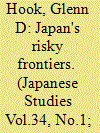

|
|
|
|
|
| Publication |
2014.
|
| Summary/Abstract |
This article investigates Japan's current role in the Senkaku Islands. The government maintains administrative control of these tiny, uninhabited islands and rocks at the frontier of Japan, but both the governments of China and Taiwan dispute Japanese claims to sovereignty and claim sovereignty over the islands themselves. Whilst much of the extant literature examines these competing claims, this article instead explores the relationship between risk, sovereignty and governance at the frontiers of Japan. It seeks to demonstrate in particular how the governance of Japan's maritime frontiers reflects a broader process of the recalibration of risk by the Abe Shinz? government as part of ending the postwar regime. Its main purpose is twofold: first, to illuminate how the government carries out administrative control and governance of a remote, uninhabited territory when sovereignty is challenged and in dispute; and second, to elucidate how the government's recalibration of risk generates a range of costs for the Japanese market and society as a result of the deterioration of relations with China arising from the way risk is being recalibrated.
|
|
|
|
|
|
|
|
|
|
|
|
|
|
|
|
| 18 |
ID:
133836
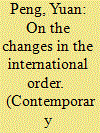

|
|
|
|
|
| Publication |
2014.
|
| Summary/Abstract |
A debate on the controversial issue of the international order has been the vogue in current times. To China high on the agenda in the defence of the post-war international order, as the Abe administration denies Tokyo's past aggression by paying homage to the Yasukuni shrines (where ashes of 14 class-A war criminals are honored), and appears to be reinterpreting its pacifist constitution in a bid to lift the ban on collective defence.
|
|
|
|
|
|
|
|
|
|
|
|
|
|
|
|
| 19 |
ID:
132882
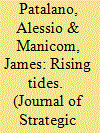

|
|
|
|
|
| Publication |
2014.
|
| Summary/Abstract |
In this issue of The Journal of Strategic Studies, we join the debate over the role that seapower plays in the current re-shaping of security relations in Northeast Asia and we aim to make three contributions to it. First, we argue that seapower matters because East Asia is a maritime region, one in which maritime forces are a primary tool underscoring both cooperative and competitive regional dynamics. Second, we suggest that claims of an emerging naval arms race in East Asia are not supported by the way the different regional countries are debating the pursuit of enhanced capabilities. In the region, there are certainly signs of capabilities procured with neighbouring actors in mind, but these procurement plans are only a fraction of much more complex and articulated policies that have to do with the wider evolving strategic meaning that the sea has for each of the nation states under examination. The third contribution of this issue concerns the realm of methodology. Over the past decade and a half, a number of new source materials emerged in China, Japan, and the Republic of Korea (ROK) that enabled scholars with language expertise to engage in greater depth in the study of defence policy and military modernisation in East Asia. The articles in this issue aim to showcase how different methodologies, ranging from contemporary history to political science, can be applied to articulate nuanced analysis.
|
|
|
|
|
|
|
|
|
|
|
|
|
|
|
|
| 20 |
ID:
133388
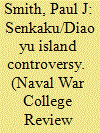

|
|
|
|
|
| Publication |
2013.
|
| Summary/Abstract |
On 11 September 2012, the Japanese government signed a contract worth 2.05 billion yen ($26.1 million) with Kunioki Kurihara, a private businessman, to purchase three of the five main islands that constitute the Senkaku/ Diaoyu Island group, an action that effectively nationalized the islands.1 Ironically, the government purchase was designed to head off more ambitious moves by Tokyo's governor (?????), Shintaro Ishihara, to purchase the islands with cash collected in a national fund-raising campaign. Ishihara, known for his nationalistic views, had told an American audience in April 2012 that the "Senkaku Islets will be purchased by the Tokyo Metropolitan Government . . . [and] we will do whatever it takes to protect our own land."2 Not surprisingly, the Chinese government viewed Japan's island-purchasing activities, whatever their motivations or sources, as severe provocations that required a firm and immediate response.
|
|
|
|
|
|
|
|
|
|
|
|
|
|
|
|
|
|
|
|
|